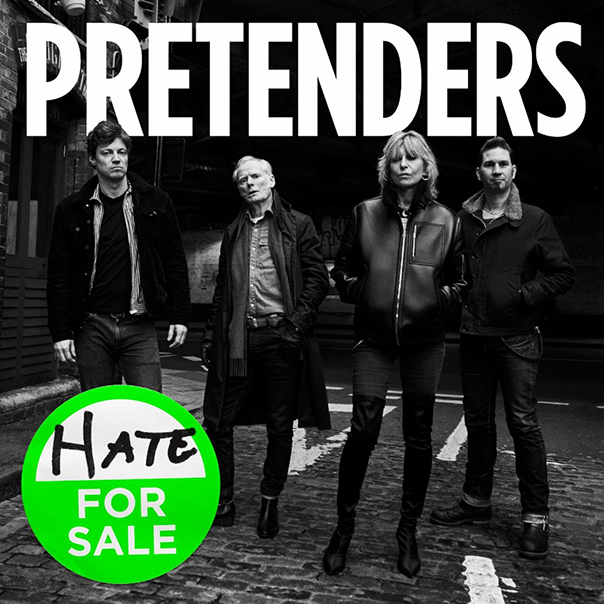ALBUM REVIEW: The Pretenders explore new sounds and signature style on ‘Hate for Sale’

More than four decades in, the Pretenders have a sound. Like Willie Nelson or Louis Armstrong, lead singer Chrissie Hynde has a voice that’s instantly recognizable. The jangly, slightly overdriven guitar sound of James Honeyman-Scott, who passed away in 1982, influenced everyone from R.E.M.’s Peter Buck to The Smith’s Johnny Marr.
Hate For Sale
The Pretenders
BMG, July 17
7/10
On their 11th studio album, Hate For Sale, the Pretenders demonstrate they can still write catchy, instantly recognizable hits, while at the same time exploring some less obvious musical genres, including punk and reggae.
The album starts with a failed count-in. After a quick “1,2,3,4” the band flails for a moment, stops, there’s a quickly muttered “sorry,” another count-in, and then the group launches into the album’s title track. The hasty excitement of the intro feels like one of those punk rock shows where neither the crowd nor those on stage can wait for the show to start. The song’s galloping lead guitar and Hynde’s blistering harmonica sound just barely controlled. Hynde’s voice feels like she’s channeling Johnny Rotten’s sneer.
The album’s second track, “The Buzz,” sounds like classic Pretenders. Hynde’s silky voice manages to evoke her signature juxtaposition of coyness and brashness.
“It’s a drug like any other/ Opiated, sugar-coated/ You’ve either got the sack/ Or about to be promoted/ At the mercy of your man/ And he’s making you wait/ For the buzz,” Hynde sings over strummed acoustic guitar. Within the delightful vagueness she is seemingly drawing connections between our desires for love, success and pleasure within a culture of consumerism.
The middle of the album feels like a plate from HomeTown Buffet: a bunch of comfort foods that taste great but feel a little weird right next to each other. “Lightning Man” has an eerie reggae feeling to it. Heavy bass pumps beneath skanky, delay-drenched guitar “chawks.” Hynde sounds a bit like Siouxsie Sioux on the verses, but the with addition of some reverb-laden guitars and rock and roll drumming, the choruses sound closer to Hynde’s hometown of Akron than Kingston, Jamaica.
“Didn’t Want to Be This Lonely” sounds like an alternate-universe version of Bow Wow Wow’s 1982 hit “I Want Candy.” From original member Martin Chambers’ tom-tom-heavy drumming intro to the overdriven bar chords played on the guitar, the musical vibe is basically the same, but Hynde’s lower voice and more casual delivery take the song in a different direction. Her lyrics perfectly capture the contradictions that riddle our heartbreaks.
“Well I didn’t want to be this lonely/ Though losing you was a relief/ From a life with one man only/ Devoid of morals or belief,” she sings.
The album closes with the piano ballad “Crying In Public.” The somber tune feels cinematic, awaiting an accompanying music video featuring a long shot of women crying in public places. Singe Hynde: “Crying in public’s an unfortunate thing/ A woman in love is a delicate thing/ And a woman who’s sad for no reason at all/ Will be crying in public in the car or the mall.”
The album seems to shine most brightly when The Pretenders are being themselves. As Coca-Cola knows all too well, when you’ve got a winning recipe, there’s no need to change it. The harmonica solo on “I Don’t Know When to Stop” will evoke instant nostalgia. Even the grittier, punk-like tunes like “Maybe Love is In NYC” never lose the inherent quality of gentleness Hynde made famous with hits like “Brass in Pocket.”
Hate for Sale is a perfect reminder of why the Pretenders have been so successful for the last 40 years: The band has managed to be authentic, simply by being itself.
Follow writer David Gill at Instagram/songotaku.
